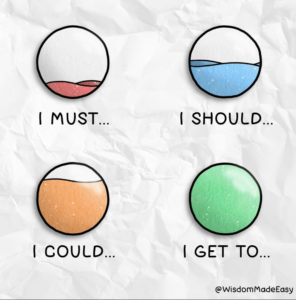Should you keep your habits and call your accountability buddy on time?
Yes! Do it.
Just don’t do it because you should.
While I’m all for keeping habits impeccably and calling each other on time, I encourage potential buddies and Habitmakers to observe a ”no shoulds zone”.
I don’t want anyone to feel obligated to keep their habits.
Not to themselves and not to each other.
As a buddy, or buddy group facilitator, I’m shoulds-free
That’s not because I think it’s a good idea to be sloppy, or that standards don’t count, they do.
It’s because of two other things.
Stop press: I’ve just opened enrolment for Best Year Ever ’24. Click here to see if it’s a habits-setting, life-affirming adventure for you.
- I want keeping habits to be fun and happiness to be a daily now, not later, thing
- It’s simply more effective to enjoy keeping the habits you keep, than suffer for them
Pushing a partner, or for that matter someone you’re coaching or mentoring, is like sliding on a persian rug along a parque floor.
You can feel like you’re gliding for a while, but then you encounter a small mountain of carpet piled up like a concertina in front of you.

Habits are best kept shoulds-free
Pushing, pressure, shoulds and obligations don’t work because they create resistance. So what kind of accountability is left?
Push and the world pushes back
When I started a switch from playing music in bars as a young man to being a journalist, I’ll admit I was pushy about it.
I pushed myself. I pushed interviewees. I though I knew how things should be done. My way.
And, no suprise, the world pushed back. I observed myself, like a car crash in slow motion, trying to exert my will over the very people who were trying to give me a break. Kind, interested record producers and talented senior BBC radio producers simply held up their hands and walked away.
It ain’t bad as long as we learn the lesson. So later, when I was experimenting with buddying and was also now leading a team of journalists, I didn’t want to repeat the mistakes I’d made.
I had heard buddy support described as a third force. The impetus that tipped the balance to something getting done.
But what were these three forces?
The three forces
I researched the law of three, an idea from the mid 20th century and the mystic Gurdjieff.
In a simple interpretation, first force is the active. It could be your idea to start a habit.
The second is the denying force, for exmaple an inner voice saying “meh, why bother”.
It’s the result of these two together that explains why things stay as they are.
Why you may go out for a run, but a mile later you’re walking.
Why you’d like to be a few kilos lighter, and you’re not.
The third or facilitating force, can be a buddy. It’s this that moves things forward, by getting behind our good intention and tipping the balance.
But a buddy process can’t actually do that, if it’s pushy. That’s just more of the first force.
Isaac Newton tells us what to expect in that case in his second law of motion.
The intention will be met by an equal and opposite resisting force.
Our solution to this conundrum at Habitmakers is to work on each of the forces individually.
First we share the benefits of having a clear, authentic intention, strengthening the active force.
Then we’ll share a beautiful and life-affirming practice to let go of the denying force, so keeping habits can become effortless.
Finally, there’s support. The third force. The Habitmakers community and all its combined good will, ideas and friendship.
Come to it in a spirit of generosity and mutuality and much good willl flow – including gazillions of kept habits and meaningful change and growth.
Like so many things, it turns out the support to keep a habit is something you only have when you give it away.
Not by shoulding the change you want, but by being it.
❖❖❖ MAGIC HABIT ❖❖❖ I was meditating, but often late at night. How to get it done early so I would enjoy its benefits for more of the day? The solution: no tea or coffee until I’d meditated (if you’re not a caffeine fanatic, swap it out for your favourite part of breakfast). If I really need flexibility, I can meditate at lunchtime, or later, but then I wait with tea and coffee (that never happens! ha ha).
Enrolment for Best Year Ever 24 is open now. Visit this sign-up page to learn more
Tim Wright is the founder of Habitmakers® and author of Habits Are Us – How intentional friendship is the key to the life you want, day after day after day. If you’re struggling to find a buddy, visit https://didu.se/join-a-programme/. Habitmakers also helps organisations create buddy systems for more engaged hybrid working. Scroll down slightly for a free download.

